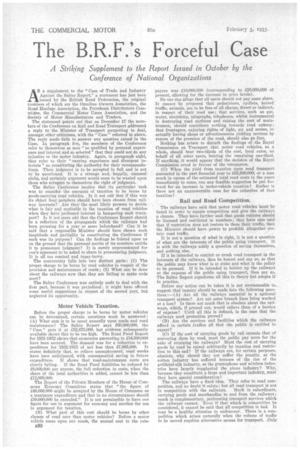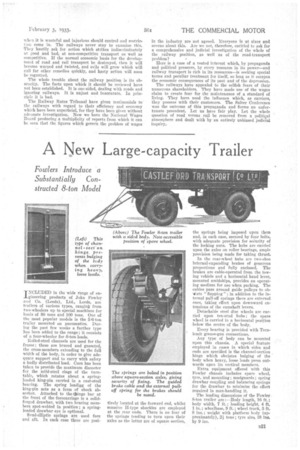The B.R.F.'s Forceful Case
Page 44

Page 45

If you've noticed an error in this article please click here to report it so we can fix it.
A Striking Supplement to the Report Issued in October by the Conference of National Organizations
ASa supplement to the " Case of Trade and Industry Against the Salter Report," a statement has just been issued by the British Road Federation, the original members of which are the Omnibus Owners Association, the Road Haulage Association, the Petroleum Distributors Commidee, the Commercial Motor Users Association, and the society of Motor Manufacturers and Traders.
The statement points out that cm December 17 the members of the Conference on Rail and Road Transport addressed a reply to the Minister of Transport purporting to deal, amongst other criticisms, with the " Case " referred to above. The reply made fails to answer any question raised in the Case. In paragraph five, the members of the Conference refer to themselves as men "so qualified by personal experience and interest and so selected" that they could not do any injustice to the motor industry. Again, in paragraph eight, they refer to their "varying experience and divergent interests" as constituting the authority for their recommendations. Their judgment is to be accepted in full and is not to be questioned. It is a strange and, happily, unusual claim, and certainly argument would seem to be wasted upon those who arrogate to themselves the right of judgment.
The Salter Conference implies that its particular task was to consider the amounts of taxation to be borne by goods-carrying road vehicles. Is it not odd that if this was its object four ,members should have been chosen from railway interests? Are they the most likely persons to decide what is fair and equitable in the taxation of road vehicles when they have professed interest in hampering such transport? Is it not more odd that the Conference Report should be a reflection of the propaganda which the railways had been pursuing for a year or more beforehand? Can it be said that a responsible Minister should have shown such ineptitude and partiality in constituting the Conference if such was its purpose? Can the findings be foisted upon us on the ground that the personal merits of its members entitle it to pronounce judgment? It is surely unprecedented for . one's opponent to be asked to share in pronouncing judgment. It is all too comical and topsy-turvy.
The controversy falls into two distinct parts: (1) The proper charge to be borne by road vehicles in respeet of the provision and maintenance of roads ; (2) What can be done about the railways now that they are failing to make ends meet?
The Salter Conference was entirely unfit to deal with the first part, because it was prejudiced ; it might have offered some useful suggestions in respect of the second part, but neglected its opportunity.
Motor Vehicle Taxation.
Before the proper charge to be borne by motor vehicles can be determined, certain questions must be answered: (A) What sum is to be spent annually upon roads and road maintenance? The Salter Report says £60,000,000, the " Case " puts it at 152,875,000, but evidence subsequently available shows this to he too high. The Road Fund Report for 1931-1932 shows that economies amounting to £34,500,000 have been secured. The demand was for a reduction in ex
penditure for 1932-1933 of not less than £7,865,000. It states definitely. that, to relieve unemployment, Toad works have been anticipated, with consequential saving in future expenditure. It shows that road-maintenance costs are clearly falling. If the Road Fund liabilities be reduced by £8,000,000 per annum, the full reduction in costs when the share of the local authorities is added, cannot be leis than £12,000,000.
The Report of the Private Members of the House of Commons Economy Committee states that "the figure of £40,000,000 might be accepted by the House of Commons as a maximum expenditure and that in no circumstances should £50,000,000 be exceeded." It is not permissible to have one figure for use in argument for economy and another for use in argument for taxation.
(13) What part of this cost should be borne by other classes of road user than motor vehicles? Before a motor vehicle came upon our roads, the annual cost to the rate
payers was £10,000.000 (corresponding to 120,000,000 at Present, allowing for the increase in price levels).
No one can allege that all users should not pay some share. It cannot be proposed that pedestrians, cyclists, horsed traffic, animals, are to be free of all charge, direct or indirect, in respect of their road use ; that serviees, such as gas. water, electricity, telegraphs, telephones, whilst instrumental in destroying road surfaces and raising the cost of maintenance, should contribute nothing towards road upkeep : that frontagers, enjoying rights of light, air and access, or actually having shops or advertisements yielding revenue by reason of the presence of the road, should also go free.
Nothing has arisen to disturb the findings of the Royal . Commission on Transport that motor road vehicles, as a whole, should bear two-thirds of the cost, local rates, on behalf of all other users, bearing the remaining onethird. If anythittg, it would appear that the decision of the Royal Commission erred in favour of the ratepayers.
(C) When the yield from taxation upon road transport amounted in the past financial year to £58,500,000, or a sum much in excess of the estimated total road costs in the years immediately to come, can any feasible suggestion be put forward for an increase in motor-vehicle taxation? Rather is there not an unanswerable case for the reduction of that taxation?
Rail and Road Competition.
The railways have said that motor road vehicles must be taxed in order to equate competition and give the railways a chance. They have further said that goods vehicles should be licensed and restricted in numbers ; they have also said that if restriction does not restore to them their traffic, then the Minister ,should have power to prohibit altogether certain road traffic.
It is not a question of what is right, it is not a question of what are the interests of the public using transport. It is with the railways solely a question of saving themselves, and nothing else.
If it be intended to restrict or crush road transport in the interests of the railways, then be honest and say so, so that the public may know what is at stake and what is the policy to be pursued. If it be intended to bolster up the railways at the expense of the public using transport, then say so. . The Salter Report repudiates all this in theory but adopts it in practice.
Before any action can he taken it is not unreasonable to. suggest that inquiry should be made into the following questions :—(A) Are all the railways essential to a national transport system? Are not some branch lines being worked at a loss? Is there not much that is obsolete about the railways, which, if pruned out, would relieve them of a burden of expense? Until all this is defined, is the case that the railways need protection proved? (B) Are the services and facilities which the railways afford in certain traffics all that the public is entitled to expect? (C) If the cost of carrying goods by rail exceeds that of conveying them by road, must the public pay more for the sake of retaining the railways? Must the cost of carrying goods by .road be raised arbitrarily by taxation and restriction to this end? If the railways are, for certain purposes, obsolete, why should they not suffer the penalty, as the cotton industry has suffered because of the rise of the artificial-silk industry, as the gramophone and wireless industries have largely supplanted the piano industry? Why. because they constitute a large and important industry, must they have special consideration?
The railways have a fixed idea. They refer to road competition, and no doubt it exists ; but all road transport is not in competition with the railways. Much is subordinate, carrying goods and merchandise to and from the railways; much is complementary, performing transport services which the railways cannot. Even if that which is competitive ha considered, it cannot be said that all competition is bad. It may be a healthy stimulus to endeavour. There is a com petition which arises naturally when the volume of traffic to be moved requires alternative means for transport. .Only
when it is wasteful and injurious should control and restriction come in. The railways never stay to examine this. They hastily ask for action which strikes indiscriminately at good and bad, at non-competitive transport as well as competitive. If the normal economic basis for the development of road and rail transport be destroyed, then it will become warped and twisted, and evils will grow which will call for other remedies quickly, and hasty action will soon be regretted.
The whole trouble about the railway position is its obscurity. The facts upon which it should be reviewed have not been established. It is one-sided, dealing with roads and ignoring railways. It is unjust and inaccurate. In principle it is bad.
The Railway Rates Tribunal have given testimonials to the railways with regard to their efficiency and economy which have been superficial, for they have been given without adequate investigation. Now we have the National Wages Board producing a multiplicity of reports from which it can be seen that the figures which govern the problem of wages in the industry are not agreed. Everyone is at sixes and sevens about this. Are we not, therefore, entitled to ask for a comprehensive and judicial investigation of the whole of the railway position, as well as of the road-transport problem? , Here is a case of a vested interest which, by propaganda and political pressure, by every resource in its power—and railway transport is rich in its resources—is seeking special terms and peculiar treatment for itself, so long as it escapes the economic consequences of its past and of the depression.
The railways have appealed to the selfish fears of their numerous shareholders. They have made use of the wages claim to create fear for the maintenance of a standard of living. They have used the influence which, as carriers, they possess with their customers. The Salter Conference was the outcome of this propaganda and forms an unfortunate precedent. Let us have fair play. Let the whole question of road versus rail be removed from a politi4a1 atmosphere and dealt with by an entirely unbiased judicial inquiry.




























































































